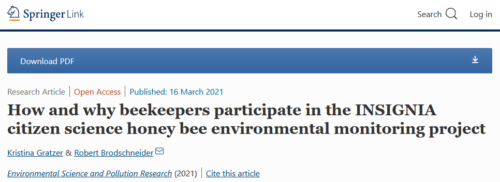Citizen science is becoming more and more popular these days, although no universal definition of the term exists. The most important aspects include the recruitment and training (or instruction) of volunteers – so-called citizen scientists. Even though citizen science has a long tradition in entomology and especially in the research on honey bees and bumblebees, the term has only been used for a relatively short time.
Researchers from the University of Graz for the first time ever investigated what motivates beekeepers to voluntary participate in a citizen science study like INSIGNIA. This specific group of citizen scientists was also asked what expectations they had from participating, which study aspects were easy or difficult for them and whether they saw added value from their participation.
The project can roughly be divided into two large parts. The first one served as a pilot study and was conducted from May to September 2019. A total of 16 beekeepers from four European countries (Austria, Denmark, UK and Greece), each with three bee colonies, took part. The aim was to identify the best suitable of four possible non-invasive sampling techniques. Part two of the project took place from May to September in 2020 and was based on the experiences of the previous year. A total of 82 volunteers from 10 European countries (the four mentioned, plus Belgium, Norway, Italy, Latvia, France, Ireland) took part and examined the environment – each one with two of their colonies.
The beekeepers’ tasks included taking samples from two bee colonies every two weeks, as well as regular online documentation of the samplings, reporting the flowering plants in vicinity of the test apiaries, storage and transport of the samples, as well as answering a voluntary survey at the end of the 2020 season.
What have we learned about the citizen scientists?

